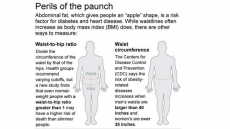TORONTO — Do you favour soft drinks over water or indulge in salty snacks during that afternoon slump at work? Maybe your serving sizes are too large? Or perhaps you don't eat breakfast or enough vegetables.
Dietitians of Canada is encouraging Canadians to take a small step toward better health during this year's annual Nutrition Month in March by picking an area to improve and making changes one meal at a time.
The group is calling the 2016 campaign "Take a 100 Meal Journey" because it's estimated Canadians will eat about 100 meals during the month, and can be well on the way to establishing a habit in that length of time.
"If you break a change into smaller goals and practise it over, say, the next 100 meals, then you don't need to focus on making big changes all at once and you can certainly focus your efforts on making small manageable changes and hope that they stick in the long run," says registered dietitian Amanda O'Brien, who's based in St. John's, N.L.
The group's research suggests there's room for improvement.
When comparing surveys conducted in 2013 and 2015, there was a 35 per cent drop in the number of Canadians who said they'd made a change to improve their eating habits.

In addition, the dietitians group points out over half of Canadians over the age of 20 live with a chronic disease like diabetes or heart disease and four out of five are at risk, with diet and lifestyle being major factors.
One area people may want to improve upon is to cook more meals at home and increase their intake of fruits and vegetables while decreasing the amount of processed foods they eat, says O'Brien.
Once you have a goal, post it where you'll see it regularly, like the fridge, your desk, Facebook page or at NutritionMonth2016.ca, where Dietitians of Canada will be adding resources, tips and recipes throughout March.
Tell friends and family about your pledge. "Research shows that when people share what their goal is they're more inclined to stick with it and achieve it," says Diana Steele, a registered dietitian in Vancouver.
Then banish foods like cookies, crackers and ice cream that you go to in weak moments.
"Stock your fridge full of eggs, fruits, vegetables, milk, yogurt, cheese," suggests Steele.
"Buy those whole grains, bulgur, barley or quinoa or oats you need to make healthy grain choices. Have the legumes like lentils and tins of chickpeas, kidney beans ready in your cupboard so when you start to make these changes in your diet you've got those foods ready and available to use."

Research shows five out of 10 women and seven out of 10 men eat more calories than they need, Steele says, so reducing serving sizes might be another goal.
Don't nibble while preparing a meal, she adds.
"You don't realize you've almost eaten a small meal before you've even sat down to dinner."
Put your fork down between bites and sit tight before taking a second serving.
"It can take some time for the messages to get from your stomach to your brain, at least 15 minutes for some people. Having foods that are more filling — so eating more vegetables that have a lot of fibre in them and whole grains — will help fill up your stomach and fill up the space which leads to a feeling of fullness," says Steele.
"But also having protein in your meals can make your energy last longer and be more satisfying and satiating."
Here are some more ideas to consider when changing eating habits:

— Keep a food journal. "Research shows people who keep track of their food by even handwriting a food journal will stick to their changes longer and people who use a nutrition-tracking app actually track their food even longer than those who hand-write it," says Steele.
— Don't worry if you fall off the wagon for one meal. "Little slip-ups are part of learning as you figure out how to solve that problem and prevent it from happening again," she says.
— Food doesn't solve the problem of being bored, stressed or lonely. Call a friend, fold laundry, go for a walk or tell yourself to wait 10 minutes when you're thinking about that chocolate that's in the upper cupboard.
— Eat more vegetables by adding spinach to a fruit smoothie. Reduce the amount of meat you eat — and lower costs too — by blending cooked lentils with ground meat for burgers.
— Swap sugary soft drinks for water or a glass of milk.




